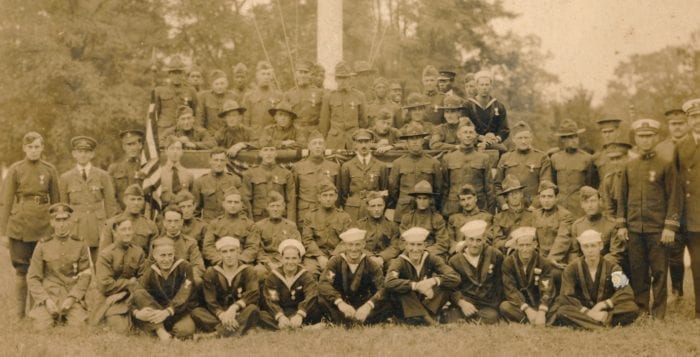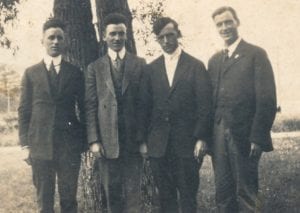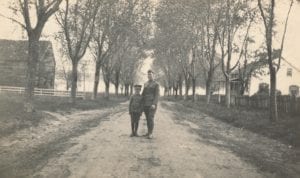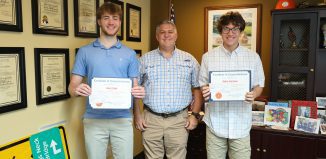Setauket residents fought in WWI, celebrated Armistice Day

By Beverly C. Tyler
“Victory and Peace,” the headline proclaimed, “War Ends — Fighting Ceased at 6 a.m. Monday.” It was Nov. 11, 1918, and World War I had come to an end for the Americans fighting in Europe. In a railway car in the French Forest of Compiègne, at 5 a.m., the German delegates accepted the strict terms of the armistice and at 11 o’clock that morning the world war came to an end.

President Woodrow Wilson that morning issued a proclamation that said, “My fellow countrymen. The armistice was signed this morning. Everything for which America fought has been accomplished. It will now be our fortunate duty to assist by example, by sober friendly council and by material aid in the establishment of just democracy throughout the world.”
The men and women who served in “the war to end all wars” were coming home. Many of the soldiers were suffering from what they called “shell shock.” Today we know it as post-traumatic stress or simply PTS. Other world war soldiers were gassed. In many of these cases soldiers came home without revealing their need for help. In other cases, soldiers were treated and released back into civilian life with or without continued care. Many soldiers never recovered from their wartime experiences.
The following year, after the soldiers and sailors had returned home, a celebration, parade and memorial service was held Labor Day, Sept. 1, 1919. As reported by the Port Jefferson Times, “All Setauket was there and most of Long Island by the appearance, for long before the time scheduled for the start of the procession, automobiles began to line the road on either side. Promptly at 2:30 p.m. the 42nd Infantry Band from Camp Upton led the parade away from the dock at East Setauket.”
The parade continued along Shore Road from the harbor and then paused while the Rev. A.Y. Holter dedicated the new East Setauket Park in honor of those who served in the war. The parade then re-formed and proceeded up Main Street, turning right at the Methodist Church and continuing to the Village Green.
The parade brought out many local groups and some $5 gold pieces were awarded as prizes. The award for the best decorated carriage went to Henry Smith of Setauket whose buggy was decorated with pumpkins and other farm products. One of the decorated trucks that didn’t win a prize was in the shape of a submarine chaser, with real guns mounted fore and aft. Among the groups that marched were the mechanics of Setauket and Port Jefferson and 70 or so soldiers and sailors who later posed for a picture on the Village Green. Others in the parade included a car filled with men who had fought in the Civil War, men on horseback, decorated trucks carrying members of various organizations and school children carrying a “Welcome Home” sign.
Muriel Hawkins, of East Setauket, daughter of Clinton West, remembered the parade and how her uncle Ernest West, who was a ship’s carpenter in the Navy, made seven trips across the Atlantic and back during the war. Ernest was one of four brothers who served during the war. The other three, George, Harvey and Percy were in the Army. All four were the sons of Setauket blacksmith Samuel West and all four returned, in some cases with mental and physical scars that would last the rest of their lives. There was, however, a lot of family support as their father, Samuel West raised 10 children, with help from his own extended family, as his wife, Ida Hulse West, died after the delivery of their 10th child.

Percy Hulse West was born July 18, 1889, and enlisted in the U.S. Army April 13, 1917. The War Department telegram written Oct. 21, 1918, to his father says, “Deeply regret to inform you that it is officially reported that Private Percy H. West, Infantry was severely wounded in action about August twenty-eight [actually July 10]. Department has no further information. Harris, Acting Adjutant General.” Over the next few months, Percy was transferred to a number of different Army hospitals including Army Hospital No. 3, Rahway, New Jersey.
On Nov. 5, 1918, Clinton West, Town of Brookhaven justice of the peace and Percy’s brother, wrote to Maj. Fayermather at the hospital requesting information “regarding the revoking of the furlough of my brother Private Percy H. West. Father was quite upset as this was Percy’s only furlough since his enlistment in May, 1917. He being the first of our local boys to return from active front line service and crippled, we had planned to give him a good time and a chance to visit his relatives and friends …” On Nov.18, 1918, Samuel West, Percy’s father wrote to Capt. Sellers to request “that Percy might be allowed a little time to see his people [in East Setauket] after the service he has rendered his country.” Additional letters from Selah Strong and H.G. Rogers were received at the hospital with the same requests.
Percy did return after he was discharged March 3, 1919, as he is pictured in the photo of the celebration on the Setauket Village Green Sept. 1, 1919, as well as a family photo taken the same day with his father and his other three brothers who served in the war.
The following year, the 1920 census lists Percy as living at “Mattawan State Hospital, Beacon, Dutchess County, NY.” In the 1930 census report, Percy was living as a boarder with Fred and Lydia Bartoo (or Barton) in Oxford, Chenango, New York, where he was working at a golf course. Percy died July 6, 1957. Percy’s brother Ernest West returned to East Setauket and continued working there as a carpenter until his death in 1966. Percy’s brother Harvey West, in 1930, was a patient in the Middletown State Homeopathic Hospital in Orange County. He later went to live with his brother George and Elsie West in Stratford, Connecticut. He died in 1967. George West, following World War I and his return home, lived the rest of his life in Connecticut, in 1920 with his sister Hazel West Jayne and her husband Robert Jayne. George married Elsie in 1922 and made his home in Stratford, Connecticut. He died in 1975.
“World War I was the first ‘modern’ war. Industry enabled weapons and explosives to be manufactured in vast quantities that brought death and destruction on a scale never previously experienced by mankind and that affected all combatants. On Sept. 18, 1918, American Sgt. Charles S. Stevenson wrote: “This is the seventh day of the St. Mihiel drive and I find myself sitting in a thick, muddy forest, with my knees and a gas mask as a table, writing to you. It was some drive. Small, in comparison to many operations, to we rookies it was a real battle. Machine guns, rifles, shells, aeroplanes and tanks — everything you read about — I saw ’em all. We followed the first line (the attacking party) for twelve hours and ours was a sort
of ‘after the battle’ review. I saw all kinds of German trenches, barbed wire entanglements, busted houses, burning trees, deep shell holes, torn-up railroad tracks, peaceful gardens, dynamited bridges.All kinds of German prisoners passed me on the way back.” (Exhibition: Fields of Battle, Lands of Peace: The Doughboys 1917-1918 — National World War I Museum, Kansas City, Missouri). This exhibit has been touring the world and is now at the Navy Pier in Chicago, Illinois until Nov. 18.
Beverly C. Tyler is Three Village Historical Society historian and author of books available from the society at 93 North Country Road, Setauket. For more information, call 631-751-3730 or visit www.tvhs.org.
Editor’s note: Armistice Day was changed to Veterans Day in 1954.






